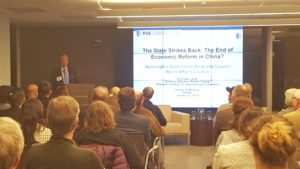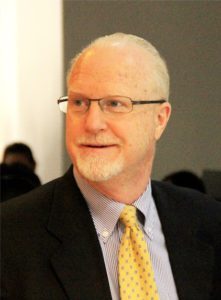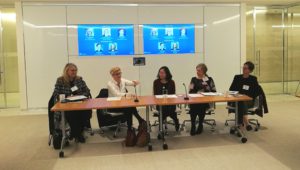 On January 23, 2019, Dr. Nicholas Lardy, the Anthony M. Solomon Senior Fellow at the Peterson Institute for International Economics and a renowned expert on the Chinese economy, presented to a large crowd at the Dorsey and Whitney about his new book, The State Strikes Back: the End of the Economic Reform. Dr. Lardy argued that China’s recent slowing economic growth is not the result of the natural maturing of an economy, but rather may reflect the diminished pace of economic form and the resurgence of the state in resource allocation since President Xi Jinping assumed power in 2012. His talk highlighted numerous examples of the growing tilt towards the state sector, such as the delinking of credit allocation with differences between state and private sector firm rates of return on assets and the impacts of enterprise subsidies.
On January 23, 2019, Dr. Nicholas Lardy, the Anthony M. Solomon Senior Fellow at the Peterson Institute for International Economics and a renowned expert on the Chinese economy, presented to a large crowd at the Dorsey and Whitney about his new book, The State Strikes Back: the End of the Economic Reform. Dr. Lardy argued that China’s recent slowing economic growth is not the result of the natural maturing of an economy, but rather may reflect the diminished pace of economic form and the resurgence of the state in resource allocation since President Xi Jinping assumed power in 2012. His talk highlighted numerous examples of the growing tilt towards the state sector, such as the delinking of credit allocation with differences between state and private sector firm rates of return on assets and the impacts of enterprise subsidies.
Navigating the World of the U.S.-China Trade War and Technology Distrust: A Conversation with James McGregor
On January 8, 2019, James McGregor, Chairman of Greater China, APCO Worldwide, shared his insights on the current status of U.S.-China relations. He argued that the current trade war is not another downturn in U.S-China relations, but rather a paradigm shift that’s uncertain how it will end. James suggested that joining a trade pact such as TTP would allow for the two different systems to form an enforceable, multilateral and rule-based trading framework.
Washington State China Relations Council appoints J. Norwell Coquillard as the new Executive Director
 Marc Berger, the Chairman of the Washington State China Relations Council announced that . J. Norwell Coquillard have been appointed as the new Executive Director of the WSCRC.
Marc Berger, the Chairman of the Washington State China Relations Council announced that . J. Norwell Coquillard have been appointed as the new Executive Director of the WSCRC.
Mr. Coquillard’s background includes over 33 years of living in Asia primarily in Japan and China. For the major share of that time he was President of the agribusiness firm, Cargill Incorporated, in those two countries. He moved from Tokyo to Shanghai in 1998 and witnessed the tremendous change and development that China experienced during those 18 years. In his time in China he helped Cargill build a business from one that employed approximately 300 people in four locations to one that had over 5,000 employees in over 40 operations nationwide. Mr. Coquillard served as the Chairman of the American Chamber of Commerce in Shanghai (Amcham) from 2008 to 2009. From 2010 until returning to the U.S. in 2016, he ran the China branch of the international non-profit, Enactus.
WSCRC 2019 Mid-Year Report
The year 2019 not only marks the 40th anniversary of normalization of the diplomatic relationships between the U.S. and China, but also the founding of the Washington State China Relations Council (WSCRC), the oldest state-level organization devoted to supporting and strengthening economic, social, and cultural ties with China. Over the last four decades, the Council has played a key role in forging a strong and resilient relationship with China, as a thought leader in the bilateral relationships, a convener of high quality programming activities, highly effective resource and point of contact to connect our members with our partners both in Washington state and China, as well as an advocate for our members to advance their top priorities.
While our relationship with China is constantly growing and changing, we clearly stand at the brink of a new chapter in the bilateral relationship and in China’s role in the global community. The current U.S.-China trade dispute has had significant adverse impacts on Washington state. More than ever, strengthening the partnership between China and the U.S. is crucial. It’s critical for the WSCRC to honor our legacy and work closely with our members and partners to face these challenges and create opportunities for a stronger and mutually-beneficial relationship.
In the first half of 2019, we have worked with our members and partners on a number of high level programs to help our community understand key U.S.-China related issues with a particular focus on trade. The Council has also gone through a leadership transition, welcoming both a new chair and executive director. This mid-year report provides a summary of the work carried out the first half of 2019, along with leadership and membership updates.
Please click here to read the full report.
US-China Women’s Leadership Forum: Professional Growth Advice for Attorneys
 On January 9, 2019, the Washington State China Relations Council organized a panel discussion as part of the U.S.-China Women’s Leadership Forum. The discussion focused on professional growth advice for attorneys, and was led by three legal practitioners experienced in China/Asia and U.S. relations. Sara Sandford, a principal attorney at Garvey Schubert Barer, works with clients from around the world in all stages of establishing, acquiring, and operating businesses across borders. Amy Sommers was former chief representative of K&L Gates in Shanghai, advising multinational companies on their strategic initiatives. Yuping Wang, a partner at Davis Wright Tremaine, advises U.S. and foreign companies on their operations in China. WSCRC Board Directors Annamarie Larson, attorney at K&L Gates, and Ada Danelo, attorney at Garvey Schubert Barer, moderated the discussion.
On January 9, 2019, the Washington State China Relations Council organized a panel discussion as part of the U.S.-China Women’s Leadership Forum. The discussion focused on professional growth advice for attorneys, and was led by three legal practitioners experienced in China/Asia and U.S. relations. Sara Sandford, a principal attorney at Garvey Schubert Barer, works with clients from around the world in all stages of establishing, acquiring, and operating businesses across borders. Amy Sommers was former chief representative of K&L Gates in Shanghai, advising multinational companies on their strategic initiatives. Yuping Wang, a partner at Davis Wright Tremaine, advises U.S. and foreign companies on their operations in China. WSCRC Board Directors Annamarie Larson, attorney at K&L Gates, and Ada Danelo, attorney at Garvey Schubert Barer, moderated the discussion.
Based on their personal experiences, the speakers shared their candid insights on a series of questions that are central to practicing cross-border U.S.-China laws with the audience—a group of female attorneys and law school students.
Generalist approach vs. specialized approach to practicing in U.S.-China laws. All three speakers agree that even though a legal practitioner must possess strong skills in areas of practice, it is also important to understand related issues to avoid being pigeonholed, especially when working in a small firm. They also spoke highly of the role of business organizations, specifically WSCRC, in helping to build professional networks. Panelists predicted that intellectual property, data privacy, and healthcare will be increasingly important practice areas in the future.
How to find and retain clients? All speakers see professionals in the other fields, lawyers in other jurisdictions, colleagues, and existing clients as important sources of finding new clients. Regarding retaining clients, echoing Sara’s remarks, Yuping emphasized existing clients are a legal practitioner’s “bread and butter,” not only because they are easier to work with due to longstanding relationships, but also because it means less marketing time. Most of her project-based clients are in fact from existing clients.
Practicing in China or in the Chinese office of a U.S. law firm. Even though the answers depend on where a legal practitioner wants to locate, and whom they wish to represent, the consensus was that it is not easy for a foreign-trained young lawyer to work in China right now. While working in a U.S. law firm, China-born but U.S.-trained young lawyers need to be aware of and able to handle the cultural barriers of working in a U.S. firm with U.S. colleagues. They should also understand how to leverage their Chinese language skills and cultural advantages when practicing U.S.-China laws.
Useful resources that can help keep up-to-date on legal developments. Amy recommended Caixin and Sinocism as good news resources to understand overall business trends. Sara uses China Daily as a channel to receive the Chinese government’s “official” messaging, and The Economist to gain broader perspectives on key political and economic issues. Yuping finds some of the Chinese government’s websites and hotlines provide up-to-date and useful free information on tax and labor issues. Speakers and moderators reiterated that WSCRC events and programs are excellent sources to stay updated on key U.S.-China issues.
In answering questions on their biggest concerns when practicing U.S.-China law, Amy pointed out that clients often do not know the rules and are afraid of being taken advantage of. Yuping compared how U.S. and Chinese businesses and investors see and evaluate risks. Sara noted the importance of being aware of cross-cultural and cross-professional differences.
Upon conclusion, the speakers wished all young attorneys a successful career. In order to be successful, in addition to hard work and persistence, they mentioned that young legal professionals need to be themselves, show clients what they can uniquely offer, and convey to clients an understanding that they are responsible, accountable, and cooperative.
WSCRC extends special thanks to WSCRC board directors Annamarie Larson and Ada Danelo for coordinating the panel and to K&L Gates as venue host.
Summary Author: Man Wang
- « Previous Page
- 1
- …
- 20
- 21
- 22
- 23
- 24
- …
- 37
- Next Page »